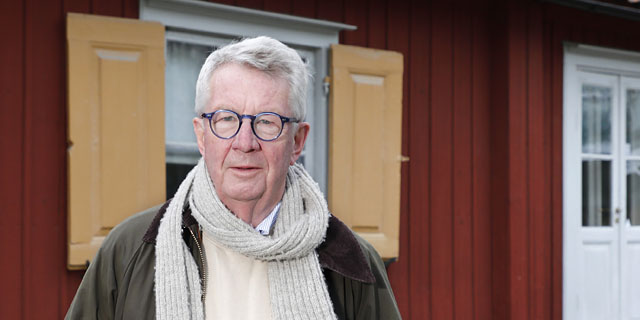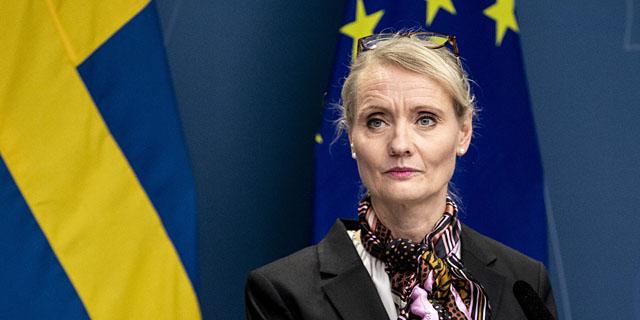
The end of Sweden’s unique approach?
THORSTEN KRÜGER, 12. Januar 2022, 0 Kommentare, PDFNote: This article ist also available in German.
In the course of the corona crisis so far, a lot of attention has been directed to Sweden’s unique approach, to manage the pandemic without implying extensive lockdowns. A look at the official statistics of Covid-19 deaths seems to show the less restrictive approach to be successful: After two peaks in spring 2020 and winter 2020/21, the pandemic is ebbing out.

Daily Covid-19 deaths in Sweden | Graphic: Swedish Public Health Authority Folkhälsomyndigheten, as of January 8, 2022, source
What’s more astonishing is that the new social democratic Prime Minister Magdalena Andersson is vehemently driving a project of the previous government of her party friend Stefan Löfven to largely exclude the so-called “unvaccinated” from social life.
Covid passports according to EU standards have been issued in Sweden since summer 2021. The Covid passport is mainly used as proof of vaccination. Obtaining the "recovered" status is very difficult, because in Sweden those who are suspected of having Covid-19 usually take their own test sample as instructed by the health service. For reasons of protection, this may be a sensible procedure, but in this case a positive test result does not entitle the person to get an entry in the Covid passport, as the sample was not taken by medically trained staff.
Instead of resolving this contradiction, the responsible health authority is putting the responsibility on "the EU rules". Negative tests, on the other hand, are uncommon – with the exception of their use as requirement for travels. This makes Sweden a pioneer for a “vaxxed only” strategy in Europe. The time has been cleverly chosen to take advantage of the comparatively high herd immunity and to reinterpret the expiring pandemic as evidence for the success of the rigorous strategy.
A trial balloon is launched
On December 1st, the first stage was put into practice for events with more than 100 people in closed rooms. The new regulation now gives organizers the choice of either allowing access only to those who have official evidence of being fully vaccinated, or to assign participants fixed spaces with 1 meter distance from each other.
Do organizers really have a choice? The example of the “Human Rights Days” in Gothenburg at the beginning of December shows how the regulation was drafted. Due to the flow of visitors, the only alternatives left to the organizer were either to restrict access to those who were completely vaccinated or to cancel the event completely. Instead of sending a clear signal of protest, the organizers opted for the restriction of access. The fact that the Swedish Discrimination Ombudsman became a cooperation partner of a discriminatory event gives the process a special irony.
In contrast, the new regulation gave the cinema monopoly, Filmstaden, less headache. Without further ado, all visitors who were not (or only partially) vaccinated against Corona were not welcome in any cinema – regardless of the room size. Due to protests, after a few days, Filmstaden reorganized and limited the regulation to the few large cinema halls.
For minor businesses however, the new rules mean an act of balance, because each customer can more or less make the difference between profit and loss. As it does not correspond to the Swedish mentality to make independent decisions, concerned entrepreneurs hang on the authorities’ overloaded telephone hotlines for hours in order to find viable ways for each individual case.
Likewise, a proclivity for confrontation is not particularly pronounced in Sweden. The first weekend with the event restrictions was comparatively calm. In Trollhättan there was a violent argument between the security guard of a nightclub and three rejected visitors. The employee later explicitly stated to the police that he did not want to contribute to the investigation. This shows the problem that the private security guards do not want to take their intended role as auxiliary policemen for the health authority without further ado.
The next level
On December 23, 2021, the regulations for the use of vaccination certificates were tightened further. The upper limit has been reduced from 100 to 20 people for most indoor events. In addition, where the vaccine passport is not asked for, strict distance rules apply, which in fact make every event uneconomical. If more than 500 people gather, no alternative is given to stipulating proof of vaccination.
In a further step, at the beginning of the year, the government legally enabled the potential extension of the “vaxxed only” rule to restaurants and fitness studios and transferred the decision on its introduction and implementation to the Public Health Authority.
This would mean that essential parts of social interaction would be closed to anyone who was not “fully vaccinated”. According to the logic of the government, this measure is to protect the people who have not yet found their salvation by the vaccine.
The Public Health Authority – between science and politics
The state epidemiologist Anders Tegnell gained recognition through his media presence. In fact, his position is not as prominent as it may appear to the public. Rather, in his apparently scientific role, Tegnell is tied into a network of dependencies.
The Swedish Public Health Authority Folkhälsomyndigheten (FoHM) is a mixture of authority and scientific institution. The FoHM was created in 2014 at the suggestion of Fredrik Reinfeldt's conservative government from the merger of the Public Health Institute and the Infection Protection Institute. Formally, the FoHM has an advisory function for the public administration, which is by no means linked to independence. This is because the government appoints the general director, who in turn appoints the state epidemiologist and his deputy.
At the beginning of the crisis, it was primarily the state epidemiologist Anders Tegnell and his deputy Anders Wallensten who represented the Swedish corona strategy to the public. Excerpts from Tegnell's professional email correspondence showed the formative influence of Tegnell's predecessor Johan Giesecke, who, in the absence of a vaccine, placed the achievement of herd immunity at the center of strategic considerations. In addition to his work for the World Health Organization, Giesecke was hired by the Public Health Authority as a consultant for 2020, but continued to appear in the media as an independent expert. The cooperation ended prematurely in September 2020 by mutual agreement.

Johan Giesecke | photo: picture alliance / Patrik C Österberg
Apparently, in early summer 2020 there was a change in the strategic approach of the Public Health Authority. A clear indicator was that the deputy state epidemiologist Anders Wallensten was seen less often in the press conferences of the authority. In his place, Karin Tegmark Wisell, Head of the Department of Microbiology, stepped into the limelight. In December 2020 Tegmark Wisell became deputy state epidemiologist and in November 2021 she reached her preliminary career climax as the new director general of the Public Health Authority, after the retirement of her predecessor Johan Carlson who had built up the authority since 2014.

Karin Tegmark Wisell | photo: picture alliance / TT NYHETSBYRAN | Christine Olsson/TT
A spicy detail: In December 2020 – at the peak of the second wave, when sports facilities were closed and even children were banned from ice skating – Anders Wallensten, formally still deputy state epidemiologist, published his personal book "Hälsogåtan" (The Health Puzzle), in which the outdoor enthusiast presents his holistic understanding of health. In the booklet one reads:
“Here the health puzzle is solved from an evolutionary, scientific and experience-based perspective. It's about how our body works and about nutrition, exercise, sleep, relationships and the environment. You get the knowledge and tools to make informed health decisions that fit right into your life."

Anders Wallensten | photo: picture alliance / Aftonbladet | BYRMO CAROLINA/Aftonbladet
The AstraZeneca vaccine: no success story
One of the pioneers in vaccine development was the Jenner Institute at Oxford University. The original intention was to make the knowledge about the promising vector vaccine available royalty-free, but the Gates Foundation and the British government used their influence to force a cooperation with a well-known large pharmaceutical company. In April 2020, an exclusive contract was signed with the British-Swedish pharmaceutical company AstraZeneca to further develop, manufacture and sell the Oxford vaccine.
In July 2020, the AstraZeneca vaccine was judged to be a leader on the road to regulatory approval. After the Swedish government had to accept bitter criticism regarding the high number of deaths in the initial phase of the pandemic, they now deemed themselves on the winning side by promoting a new pro-active vaccination strategy.
Contrary to expectations, however, the optimistic hope from Oxford did not develop into a success story in the end. In May 2021, it was decided to stop using the AstraZeneca vaccine in Sweden.
Corona in the political pitch
In June 2020 the Swedish government set up a commission to evaluate the measures to control the spread of Covid-19. On December 15, 2020, the commission published its first partial report on the situation of elderly care during the pandemic. The commission criticized the inadequacies of the Swedish system with unexpected clarity. In the traditional royal review of the year, produced by the public service television, King Carl Gustaf found unusually clear words: "I think we have failed."
The royal statement put the red-green minority government under pressure to act. A Covid-19 law was hastily prepared over the holidays, giving the government extensive powers to govern with ordinances and, if necessary, to massively restrict fundamental rights. The Swedish parliament, which had already been demoted to an emergency parliament at the beginning of the crisis, went along with only 55 handpicked members with voting rights. After coming into force on January 8, 2021, the Covid-19 law was primarily used to massively limit the freedom of demonstration.
The failure of AstraZeneca hit Sweden amid a period of increasing political instability that culminated in a tactical vote of no confidence in prime minister Stefan Löfven on June 21, 2021. After several months of a political whodunnit, the former finance minister Magdalena Andersson was elected as the new head of government on November 29, 2021 – thanks to a peculiarity of the parliamentary system in Sweden. The head of government does not need his own parliamentary majority in his election, he just must not have a majority against him. This system favors minority governments and changing majorities, but it also makes tolerance a political commodity. Andersson is now the head of a social democratic one-party government, which is based on just 100 of 349 MPs.
Nine months before the next parliament elections, however, Andersson's leeway is significantly smaller compared to her predecessor Löfven. The Greens and the Liberals are two parties that worry about their return to the parliament. And the Left Party deems itself on the upswing after its clear profiling during the summer. These are conceivably poor conditions for prestige projects to impress the voters.
The only area in which Magdalena Andersson can still use her bonus as prime minister is the Corona policy, as none of the parliament parties has so far taken a clearly dismissed position. With her rushing ahead for “vaxxed-only”, Andersson is playing this card, in order to prove her ability to act as a political crisis manager.
Condemned to sit and watch?
With such political unanimity, critical citizens initially appear powerless. Nevertheless, the reaction from the population was not long in coming.
The Justice Ombudsman (JO) is an instance of the parliament that controls large parts of the public administration. When the government announced the introduction of vaccine passports to control access to public events, the Justice Ombudsman was inundated with reports. These were primarily directed against the politically controlled Public Health Authority and its active commitment to medical apartheid. Within a few weeks, over 10,000 reports were received, which is more than the Justice Ombudsman usually registers in a whole year. However, anyone who hoped for a functioning supervisory authority received a special kind of Xmas gift from the JO. The reports were simply abolished without further investigation.
And what about the Constitutional Court, a reader might ask. The answer is as simple as it is unsatisfactory: In Sweden there is no constitutional court and therefore no possibility of judicial review. This design flaw has accompanied Sweden as a “role model for modern democracy” since the introduction of the new constitution in 1974.
Bills can be submitted by the government to the Law Council – a body of high-ranking judges – for review before they are proposed to the parliament. However, like the Council's opinion, the procedure is by no means binding.
The Covid-19 law that passed in January 2021 would probably have failed in a constitutional lawsuit, simply because of the formal error of not determining an epidemic situation according to the constitution as a prerequisite for the special regulations. The introduction of vaccine passports as an instrument for control, based on the Covid-19 law, was classified in law journals as clearly unconstitutional.
Bleak prospects?
The Omicron variant is not yet dominant in Sweden, but the figures from neighboring Denmark already suggest that a strategy based purely on vaccination can hardly catch up with the mutation advantage of SARS-CoV-2. It would be astonishing if the foreseeable development did not lead Andersson’s government to further populist measures. Since the final report of the Corona Commission is scheduled for February 2022, the clear demarcation from her predecessor Löfven could become a political question of survival for Andersson.
However, it remains questionable how long the Swedes will tolerate the ongoing breach of the constitution. In the reader comments of the major daily newspapers, there is now solidarity between vaccinated and unvaccinated people who are committed to upholding the fundamental rights of all fellow citizens. And in the press conferences of the Public Health Authority, the critical questions increase, even from the established media.
Law obliges the Public Health Authority to work evidence-based. As an authority, FoHM is also subject to the legal liability of malpractice, even in the case of simple negligence. The first reports directed against the heads of the authority have already been received.
Several demonstrations are announced in the major cities of Sweden in January. The events are organized on a decentralized basis, but are well networked nationwide and internationally.
About the author: Thorsten Krüger, born in 1965, grew up in Schleswig-Holstein, Germany's northernmost state. He studied pharmacy and oceanography and worked as a pharmacist, project coordinator and entrepreneur. Since 2003 he has lived in the archipelago between Sweden and Finland.
Further article on the topic:
- Was Sweden more successful? (Karsten Montag, 15.8.2021)

Diskussion
0 Kommentare